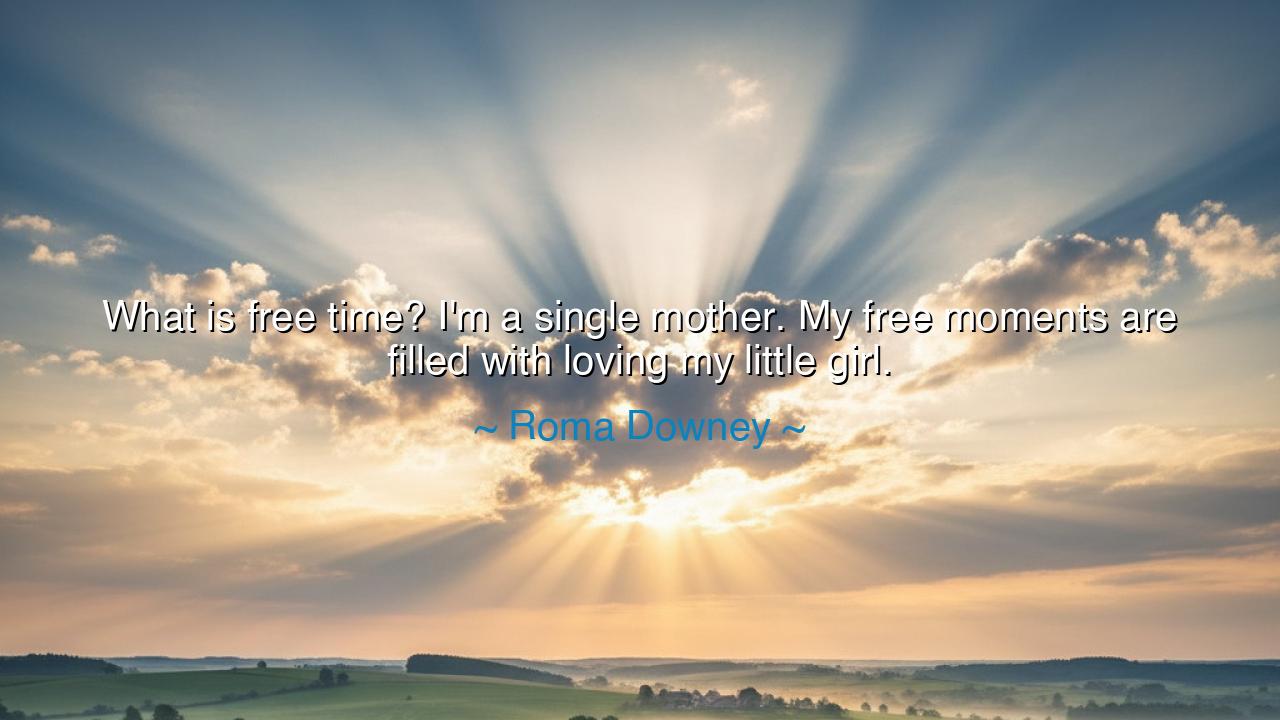
What is free time? I'm a single mother. My free moments are
What is free time? I'm a single mother. My free moments are filled with loving my little girl.






In the tender and resolute words of Roma Downey, “What is free time? I’m a single mother. My free moments are filled with loving my little girl,” we hear the quiet nobility of sacrifice transformed into love. Beneath her simple statement lies an ancient truth—the kind of truth that mothers have known since the beginning of time: that love is not leisure, and that to give one’s life to another is not a burden, but a holy calling. Downey’s words are not a complaint but a confession of joy, the voice of a woman who has chosen devotion over rest, and who finds her freedom not in escape from duty, but in the embrace of love’s purpose.
Roma Downey, beloved for her role in Touched by an Angel and known for her deep spirituality, spoke these words from her own life experience. As a single mother, she carried the weight of both protector and nurturer, provider and comforter. In her words, we sense both exhaustion and transcendence—the acknowledgment that motherhood leaves little room for personal indulgence, yet also the awareness that these sacrifices are the fabric of something divine. The origin of her quote lies in this truth: that time given to love is never lost time, and that the purest form of fulfillment often grows from the soil of selflessness.
The ancients too revered this sacred paradox. Among them, the concept of duty was not a prison but a pathway to greatness. In the East, the philosopher Lao Tzu spoke of the one who serves with love as one who lives in harmony with the universe. In the West, the poet Virgil wrote that “love conquers all,” not as sentiment, but as endurance. And in every age, the image of the mother—tireless, watchful, gentle—stood as the eternal emblem of that love which asks nothing in return. Downey’s reflection belongs to this lineage of wisdom, teaching that sacrifice born of love is the highest form of freedom, for it liberates the soul from selfishness and unites it with purpose.
Consider the life of Corrie ten Boom, a woman who, during the Second World War, risked her life to shelter the persecuted. Though she had no children of her own, she lived the spirit of motherhood—giving comfort to the terrified, food to the hungry, and faith to the despairing. She, too, had no “free time.” Every hour was consumed by compassion. Yet in her memoir, she wrote, “There is no pit so deep that God’s love is not deeper still.” Like Downey, her moments were filled not with leisure, but with love, and through that love, she found peace even in suffering. The mother’s heart, whether in the home or in the world, finds meaning not in freedom from duty, but in the sacred act of care.
When Downey says her free moments are spent “loving my little girl,” she reveals something that the modern world often forgets: that love itself is a form of prayer. To hold a child, to teach her, to comfort her tears—these are not interruptions to life; they are life itself. The mother who rocks her child to sleep participates in the same creative power that formed the stars. Her labor is holy because it is born of tenderness, and her exhaustion is sanctified because it springs from devotion. Her love is her worship, and her time, though consumed, is made eternal through it.
This quote, then, speaks not only to single mothers, but to all who serve others selflessly. It reminds us that meaning is not found in the abundance of leisure, but in the depth of giving. The ancient heroes sought glory on battlefields; but the mothers of the world wage their wars in kitchens, in classrooms, in the quiet hours before dawn—wars against fatigue, doubt, and despair. They emerge not crowned with gold, but with the unseen glory of perseverance and love. Theirs is the heroism that sustains civilization itself.
Let this truth be passed down as a lesson for every generation: the measure of a life is not how much time one has for oneself, but how one spends it in love for others. The mother’s love, though it demands everything, gives back more than it takes. It teaches that fulfillment is not found in pleasure, but in purpose; not in escape, but in engagement. To live as Roma Downey speaks is to live in harmony with the divine rhythm of creation—where every act of care, every sacrifice, every loving word is a thread in the tapestry of eternity.
Thus, Roma Downey’s gentle words stand as a hymn to all who love beyond themselves. She reminds us that there is no such thing as “free time” in the heart that loves deeply—for such a heart is always at work, shaping the world in quiet, unseen ways. And in this tireless giving, there is no loss—only grace. For when life is filled with love, time ceases to be measured in hours, and begins instead to be measured in moments of the soul.






AAdministratorAdministrator
Welcome, honored guests. Please leave a comment, we will respond soon